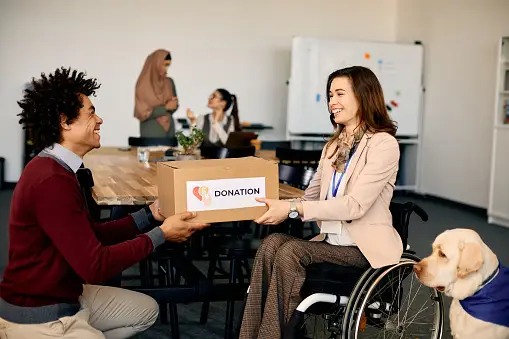Nigeria has emerged as a dynamic and resilient player in the world of international development and economic transformation. So, it has attracted World Bank Grants in Nigeria.
As this West African nation strives for economic growth and poverty reduction, the World Bank’s role has been instrumental.
Through grants and support, the World Bank has become a vital partner in Nigeria’s journey towards prosperity and sustainability.
Nigeria, with its rich cultural diversity and abundant resources, stands poised for economic advancement.
However, to realize its full potential, it requires financial backing and expertise, which the World Bank readily provides.
In this blog post, we delve deep into the world of World Bank grants in Nigeria, exploring their significance, impact, and the transformative power they hold.
Join us on this enlightening journey as we uncover the various facets of World Bank grants in Nigeria.
This blog post will help you understand the types of grants explore their application process and assess their impact on crucial sectors like education and healthcare.
This blog post aims to provide you with a comprehensive insight into how these grants are shaping Nigeria’s future.
Nigeria, a country rich in resources and potential, has faced various economic challenges over the years.
To address these issues and promote sustainable development, the World Bank has been actively involved in providing financial support through grants.
This article delves into the various aspects of World Bank grants in Nigeria, shedding light on their significance and impact.
Table of Contents
The World Bank: An Overview
The World Bank is an international financial institution that provides financial and technical assistance to developing countries worldwide.
It consists of two main institutions: the International Bank for Reconstruction and Development (IBRD) and the International Development Association (IDA).
These institutions work together to reduce poverty, promote economic growth, and support infrastructure development.
The World Bank’s grants are typically provided to the government of Nigeria, but they can also be provided to non-governmental organizations (NGOs) and private sector companies.
The amount of funding that is provided depends on the specific project.
The World Bank Grants That Are Currently Available in Nigeria:
- Nigeria for Women Program Scale Up (NFWP-SU): This grant is supporting the government of Nigeria to improve the livelihoods of women in Nigeria.
- Nigeria Economic Sustainability Program (NESP): This grant is supporting the government of Nigeria to implement reforms to improve the economy.
- Nigeria Power Sector Recovery Program (NPRP): This grant is supporting the government of Nigeria to reform the power sector.
- Nigeria Social Investment Program (NSIP): This grant is supporting the government of Nigeria to provide social safety nets to vulnerable populations.
If you are interested in applying for a World Bank grant, I recommend that you contact the World Bank office in Nigeria as soon as possible.
The application process can be competitive, so it is important to start early.
World Bank Grants vs. Loans

One key distinction to understand is the difference between World Bank grants and loans.
Grants are non-repayable funds provided to countries, while loans must be repaid with interest over a specified period.
Nigeria receives both grants and loans from the World Bank, with grants often designated for specific development projects.
Types of World Bank Grants
Investment Project Financing
Investment Project Financing is a type of World Bank grant used to support infrastructure development in Nigeria.
This funding is directed towards projects that aim to improve transportation, energy, and other critical sectors.
Development Policy Financing
Development Policy Financing grants are designed to support Nigeria’s economic reforms and policy initiatives. These grants help strengthen governance, improve public financial management, and enhance the business environment.
Technical Assistance
Technical Assistance grants provide expertise and knowledge transfer to Nigerian institutions.
This assistance aids in capacity building and skill development in various sectors, including education, healthcare, and agriculture.
The Application Process
Eligibility Criteria
To access World Bank grants, Nigeria must meet specific eligibility criteria, including demonstrating a commitment to implementing development projects effectively and transparently.
Application Requirements
The application process for World Bank grants is rigorous and includes detailed project proposals, budget plans, and impact assessments.
Nigeria must ensure that its applications align with the country’s development priorities.
To apply for a World Bank grant, you must first contact the World Bank office in Nigeria.
The World Bank office will provide you with more information about the application process and the eligibility requirements.
The Impact of World Bank Grants in Nigeria
World Bank grants have significantly impacted Nigeria in several ways.
1. Infrastructure Development
Grants have facilitated the construction of vital infrastructure such as roads, bridges, and power plants. These improvements have boosted economic activities and enhanced the overall quality of life.
2. Poverty Alleviation
Through targeted projects and programs, World Bank grants have played a vital role in reducing poverty levels in Nigeria, providing opportunities for income generation and livelihood improvement.
3. Education and Healthcare
World Bank grants have supported the Nigerian government in improving access to quality education and healthcare services, leading to better social development outcomes.
Challenges Faced by Nigeria
However, Nigeria faces challenges in effectively utilizing World Bank grants.
1. Accountability and Transparency
Ensuring that funds are used efficiently and transparently remains a challenge. Nigeria must strengthen its accountability mechanisms to prevent misuse of funds.
Project Implementation
Efficient project implementation is crucial for maximizing the impact of World Bank grants. Delays and mismanagement can hinder progress.
Success Stories
Despite challenges, there have been success stories where World Bank grants have made a significant difference in Nigeria’s development journey. These stories serve as inspiration for future projects.
Future Prospects
The future looks promising as Nigeria continues to work closely with the World Bank to address its economic challenges and achieve sustainable development.
How Do World Bank Grants Work?
World Bank grants are financial aid provided to developing countries, like Nigeria, to support various projects and initiatives.
These grants are non-repayable, meaning they don’t have to be paid back.
The funds are typically channeled into projects that focus on infrastructure development, poverty reduction, healthcare, education, and more.
To access these grants, countries must meet specific eligibility criteria and submit detailed proposals outlining the project’s objectives, budget, and expected outcomes.
Once approved, the World Bank closely monitors the progress to ensure funds are utilized efficiently and transparently.
These grants play a significant role in helping countries like Nigeria address critical challenges and foster sustainable development.
Impact of World Bank grants
World Bank grants have a profound impact on Nigeria’s development.
They fuel infrastructure projects, improving transportation, energy, and basic services, thus enhancing the quality of life for citizens.
Moreover, grants contribute to poverty alleviation by creating jobs and income-generating opportunities.
In the education and healthcare sectors, these grants enhance accessibility and quality, resulting in improved human capital development.
However, challenges such as accountability and project implementation remain, and addressing them is crucial to maximizing the grants’ positive impact on Nigeria’s development.
Nigeria’s Progress With Grants
Nigeria has made significant progress with World Bank grants.
These grants have played a pivotal role in the country’s development journey, enabling it to overcome economic challenges and enhance its infrastructure significantly.
They have also contributed to reducing poverty levels and improving access to education and healthcare services.
Despite challenges in accountability and project implementation, Nigeria’s partnership with the World Bank remains promising for future growth and development.
Conclusion
In conclusion, World Bank grants in Nigeria have played a pivotal role in addressing economic challenges, fostering infrastructure development, and improving the quality of life for its citizens.
While challenges persist, the collaboration between Nigeria and the World Bank remains critical for the nation’s progress.
FAQs
How can Nigeria access World Bank grants?
Nigeria can access World Bank grants by meeting eligibility criteria and submitting detailed project proposals that align with development priorities.
What is the primary focus of World Bank grants in Nigeria?
World Bank grants in Nigeria focus on infrastructure development, poverty alleviation, education, and healthcare improvement.
What challenges does Nigeria face in utilizing World Bank grants effectively?
Nigeria faces challenges related to accountability, transparency, and efficient project implementation when utilizing World Bank grants.
Can Nigeria repay World Bank grants?
No, World Bank grants are non-repayable funds provided to support specific development projects in Nigeria.





